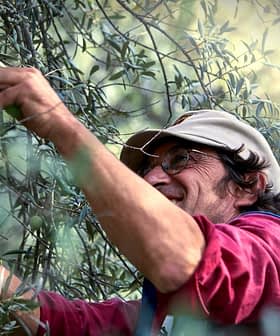Research Shows Leccino Less Susceptible to Xf
According to a new study, the Leccino olive variety appears to be ‘tolerant’ to the attack of the Xylella fastidiosa bacterium that has wiped out large swaths of Italian olive-growing regions.
 Leccino olives
Leccino olivesAccording to new research the variety Leccino appears to be ‘tolerant’ to the attack of the Xylella fastidiosa bacterium.
The study, conducted by the Institute for Sustainable Plant Protection IPSP of the National research Council of Italy CNR in Bari and the Department of Science of Soil, Plants And Food DiSSPA of the University of Bari UNIBA, was published in the international journal BMC Genomics.
Leccino is endowed with an intrinsic tolerance to Xylella fastidiosa
Researchers compared the genetic profiles of Leccino and Ogliarola salentina infected by the Xylella fastidiosa subsp. pauca (Xfp) bacterium based on field observations that suggested Xfp-infected plants of Leccino showed “much milder symptoms,” than the more widely grown and highly susceptible Ogliarola Salentina.
Therefore, researchers noted, “to determine whether these field observations underlie a tolerant condition of cv. Leccino, which could be exploited for lessening the economic impact of the disease on the local olive industry, transcriptional changes occurring in plants of the two cultivars affected by Xfp were investigated.”
See Also:Complete Coverage of the Xylella Fastidiosa Outbreak
The data suggest that “Xfp elicits a different transcriptome response in the two cultivars, which determines a lower pathogen concentration in cv. Leccino and indicates that this cultivar may harbor genetic constituents and/or regulatory elements which counteract Xfp infection.” In other words, “Leccino is endowed with an intrinsic tolerance to Xfp.”
In the last few days, Agriculture Minister Maurizio Martina said that a budget of €11 million has been set aside for the Apulian farms affected by the Xf emergency. “We proceeded to complete the process of allotment of resources and to sign the decree which allocates resources to the region for the recovery of the damage suffered,” the minister announced during a parliamentary question.
Moreover, MEPs Paolo De Castro and Raffaele Fitto have tabled a question to the European Commission asking to remove the “prohibition concerning the planting of host plants in infected zones” (provided for in article 5 of the Commission Implementing Decision (EU) 2015/789), which include the provinces of Lecce and part of Taranto and Brindisi.
The research of IPSP and DiSSPA corroborates the request but it is also a matter of concern for those who believe it could encourage the replacement in the infected area with Leccino and other tolerant varieties, not native to the region, causing a radical transformation of the territory.
“This solution will please those who work to convert the Apulian olive growing in intensive and super-intensive, calling for a revision of the laws on cutting down of monumental olive trees,” considered an independent local magazine.
However, researchers noted that “these preliminary data need extensive laboratory and field evaluation before a practical exploitation of the cv. Leccino for the management of Xfp in olives.”








